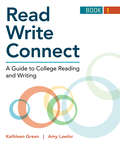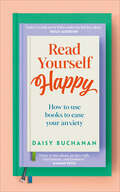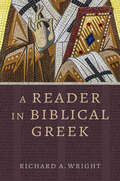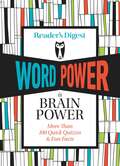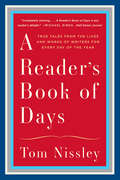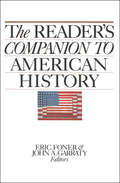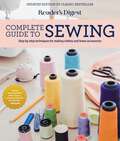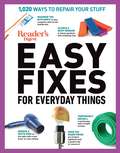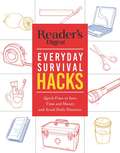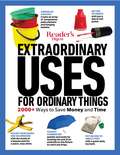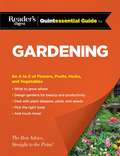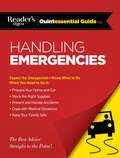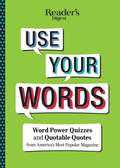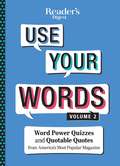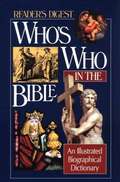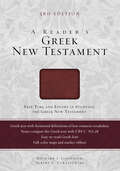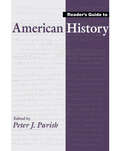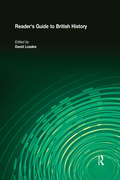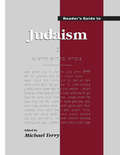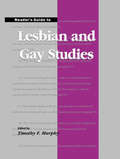- Table View
- List View
Read, Write, Connect: A Guide To College Reading And Writing
by Kathleen Green Amy LawlorThe first text in a two-part series for the integrated reading and writing course, Read, Write, Connect, Book 1, offers carefully and thoroughly integrated instruction for reading and writing at the paragraph-to-essay level. With scaffolded pedagogy and a flexible structure that reflects the recursive nature of reading and writing processes, the text allows instructors to easily differentiate instruction to meet the needs of all students. It offers intensive practice in the basic skills of reading comprehension and summary writing, and then helps students build on those skills to respond to texts critically and analytically in their own college-level paragraphs and short essays. <P><P> LaunchPad Solo for Readers and Writers can be packaged with Read, Write, Connect, Book 1 at no additional cost,, allowing you to more efficiently track students’ progress with reading, writing, and grammar skills in an active learning arc that complements the book.
Read Yourself Happy: How to Use Books to Ease Your Anxiety
by Daisy Buchanan‘Daisy’s words never fail to make me feel less alone.’- Dolly Alderton ‘Daisy Buchanan is already my go-to person for reading recommendations, and now she’s sharing her wisdom with the world! I can’t think of a better guide to the books that can heal, soothe, and inspire us.’ - Katherine May 'Daisy writes about anxiety with real honesty and kindness' Marian Keyes Read yourself calmer Read yourself courageous Read yourself free Forget ‘self-help’ and embrace ‘shelf-help’ by discovering the healing power of books and reading to inspire, comfort and fortify. In a hectic world that can feel uncertain and overwhelming, Daisy Buchanan offers the perfect antidote to all the noise, inviting us to discover the literary worlds that have helped her survive – and thrive. Featuring original interviews with David Nicholls, Ruby Rare, Emma Gannon, Catherine Gray and more, Daisy provides hard-won wisdom and personally curated reading lists to help you process your emotions and find more peace with every page.
A Reader in Biblical Greek (Eerdmans Language Resources)
by Richard A. WrightA graduated reader of biblical Koine Greek for students, clergy, and scholars who have completed at least one year of Greek studies. This intermediate reader is for students, clergy, and scholars who have completed at least one year of Greek instruction and want to build reading proficiency. Through twenty-nine texts from the New Testament, the Septuagint, and noncanonical early Christian writings, readers will be exposed to a variety of different genres and authors while still being given enough content from each author to become acquainted with that author&’s individual style. Notes within each selection gloss low-frequency words and clarify syntactical intricacies, and each new section of texts gradually increases in its level of difficulty, so that lessons can be worked through sequentially or as stand-alone exercises, as needed. Wright&’s selections are all texts that Christians in the fourth century CE would have read, with intertextual connections between them that will stimulate discussion and reflection on the development of important ideas in the early church. Thus, this useful resource encourages progress both in Koine reading proficiency and in knowledge of Christian tradition.
Reader' s Digest Word Power is Brain Power
by Reader'S DigestA collection of Word Power quizzes and other fun language and grammar facts that will appeal to word nerds, knowledge hunters, and students of all ages. Want to sound smarter in business meetings? Finally beat your brainy uncle at Word Cookies? Ace that standardized test? Whatever your reasons for wanting to improve your vocabulary, you won&’t find a funner way of doing so than Word Power (and yes, &“funner&” is really a word!). For instance, do you know what these words mean: Orthoepy – A: code. B: proper pronunciation. C: sign language. Zyzzyva – A: type of weevil. B: tricky situation. C: fertilized cell Fricassee – A: cut and stew in gravy. B: deep-fry. C: sautee with mushrooms And do know when it&’s okay to use a double negative or start a sentence with &“Because&”? Word Power will answer all these questions and much more for hours of language fun for word nerds and grammar gurus.
A Reader's Book of Days: True Tales from the Lives and Works of Writers for Every Day of the Year
by Tom Nissley Joanna NeborskyA witty and addictively readable day-by-day literary companion. At once a love letter to literature and a charming guide to the books most worth reading, A Reader's Book of Days features bite-size accounts of events in the lives of great authors for every day of the year. Here is Marcel Proust starting In Search of Lost Time and Virginia Woolf scribbling in the margin of her own writing, "Is it nonsense, or is it brilliance?" Fictional events that take place within beloved books are also included: the birth of Harry Potter's enemy Draco Malfoy, the blood-soaked prom in Stephen King's Carrie. A Reader's Book of Days is filled with memorable and surprising tales from the lives and works of Martin Amis, Jane Austen, James Baldwin, Roberto Bolano, the Brontë sisters, Junot Díaz, Philip K. Dick, Charles Dickens, Joan Didion, F. Scott Fitzgerald, John Keats, Hilary Mantel, Haruki Murakami, Flannery O'Connor, Orhan Pamuk, George Plimpton, Marilynne Robinson, W. G. Sebald, Dr. Seuss, Zadie Smith, Susan Sontag, Hunter S. Thompson, Leo Tolstoy, David Foster Wallace, and many more. The book also notes the days on which famous authors were born and died; it includes lists of recommended reading for every month of the year as well as snippets from book reviews as they appeared across literary history; and throughout there are wry illustrations by acclaimed artist Joanna Neborsky. Brimming with nearly 2,000 stories, A Reader's Book of Days will have readers of every stripe reaching for their favorite books and discovering new ones.
The Reader's Companion to American History
by Eric Foner and John A. GarratyAn A-to-Z historical encyclopedia of US people, places, and events, with nearly 1,000 entries &“all equally well written, crisp, and entertaining&” (Library Journal). From the origins of its native peoples to its complex identity in modern times, this unique alphabetical reference covers the political, economic, cultural, and social history of America. A fact-filled treasure trove for history buffs, The Reader&’s Companion is sponsored by the Society of American Historians, an organization dedicated to promoting literary excellence in the writing of biography and history. Under the editorship of the eminent historians John A. Garraty and Eric Foner, a large and distinguished group of scholars, biographers, and journalists—nearly four hundred contemporary authorities—illuminate the critical events, issues, and individuals that have shaped our past. Readers will find everything from a chronological account of immigration; individual entries on the Bull Moose Party and the Know-Nothings as well as an article on third parties in American politics; pieces on specific religious groups, leaders, and movements and a larger-scale overview of religion in America. Interweaving traditional political and economic topics with the spectrum of America&’s social and cultural legacies—everything from marriage to medicine, crime to baseball, fashion to literature—the Companion is certain to engage the curiosity, interests, and passions of every reader, and also provides an excellent research tool for students and teachers.
Reader's Digest 99 Cent Solutions: 1465 Smart And Frugal Uses For Everyday Items
by Reader'S DigestWhat's in the aisles of your favorite dollar store and how can you use them in multiple ways? 99 Cent Solutions contains 1465 smart and frugal uses for everyday items that save you time and money.99 Cent Solutions helps you save money, time and aggravation with 1465 ways to use common, everyday items found at the dollar store, grocery store or hardware store! Save money on groceries, health and beauty, cleaning supplies, housewares, tools and more. Did you know you can... -Use bubble wrap to protect freshly planted trees? -Use ketchup to make copper glow? -Use a bandage to in place of a thimble? -Use a bungee cord as a yoga strap? -Use a party balloon as an ice pack? -Use baking soda between paving stones to keep weeds away? Chapters: -Groceries -Healthy & Beauty - Outdoor Spaces -Cleaning & Home Supplies -Housewares -Notions -School & Party Supplies -Tools
Reader's Digest Complete Guide to Sewing: Step By Step Techniques For Making Clothes And Home Accessories
by Reader'S DigestAn indispensable volume for beginning and advanced sewers alike that guides readers through necessary equipment, techniques, fabrics and more.First published in 1978, Reader&’s Digest&’s popular Complete Guide to Sewing has become the standard stich-and-seam reference book for both beginner and seasoned sewers. Now, Reader&’s Digest has refreshed this tried-and-true volume for the modern era, adapting it to current trends while preserving the comprehensive, practical and inspiring content within. Reader&’s Digest Complete Guide to Sewing gives sewers of every experience and comfort level everything they need to know to create the wardrobe of their dreams and beautify their homes with original decorative accents. Clear, simple instructions written by experts in the field tell you what to do and how to do it. Plus, thousands of illustrations and diagrams throughout the book&’s 384 pages illustrate each stage of the process. Key elements of the book include: A detailed list of the basic equipment you&’ll need before getting started sewing. Tips for choosing the right fabric for your project. A step-by-step photo guide that shows you how to take measurements. Instructions in a variety of essential hand-stitching techniques. 20 timeless projects— more than half of them new to this edition—to practice your skills including shirts, dresses, bags, and more. Plus, the book has received endorsements from a variety of trusted sources: &“…and I always recommend the Reader&’s Digest Guide to Sewing. It&’s very comprehensive and very user-friendly.&” —Tim Gunn &“…abundant and precise line art, enticing photographs, simple-to-follow instructions and valuable information on tools, supplies, materials and techniques.&” —The New York Times &“A woman who takes sewing seriously, or who wants to learn to sew, won&’t want to be without this book.&” —Portland Oregon Journal &“Here is everything you always wanted to know about sewing—a veritable encyclopedia of stitching facts.&” —The Austin American Statesman
Reader's Digest Easy Fixes for Everyday Things: 1,020 Ways to Repair Your Stuff
by Editors of Reader's DigestEasy Fixes for Everyday Things is fresh, surprising, and honest: if something can be fixed we show you how; if it needs expert attention we say so; and if it is simply beyond hope, we tell you that, too. Maybe your smartphone fell in water or you spilled coffee on your computer keyboard. Perhaps your iron won't produce steam or your refrigerator is making an odd noise. It could be that your watch face has been scratched or the chain on your bike keeps falling off. Whatever the problem, Easy Fixes for Everyday Things has your solution. We all rely on devices, appliances and pieces of household equipment that break, misbehave or fail completely. With Easy Fixes for Everyday Things you can help yourself when disaster strikes, saving time, money and hassle (and cutting down on needless waste) simply by following a few straightforward steps. This fun yet practical book strips the mystery from repairs, enabling you to fix the seemingly unfixable and solve more than 1,000 everyday problems with phones, cameras, laptops, locks, washing machines, lawn mowers, water pipes, cars and dozens of other common household things.
Reader's Digest Everyday Health Hacks: Quick Fixes to Prevent Disease and Improve Your Wellbeing
by Reader'S DigestMore than 500 little tweaks to your routine that are scientifically proven to help you lose weight, prevent disease, and even wipe years from your appearance. If you&’ve burned out on the paleo or keto diets and have fallen off the Peloton and HIIT wagon, try Health Hacks. These simple tips and tricks allow to sneak healthy choices into your day without overhauling your lifestyle. For example: * Start your day with a cup of hot cocoa while you tackle your most creative work. Research finds that one cup of cocoa a day for five days can increase blood flow in the brain, hands, and legs, and helps regulate blood pressure. *Move your bed away from any outside walls. This will help cut down on noise, which a Spanish study found could be a significant factor in insomnia. *When you&’re nervous, tighten and release your abdominal muscles over and over again. You&’ll strengthen your abs and take your mind off your anxiety at the same time. Like all Reader's Digest health books, the information in the book is reliable and based on authoritative information but presented in an easy-to-understand and easy-to-implement way.
Reader's Digest Everyday Survival Hacks
by Reader'S DigestMore than 500 simple tricks to avoid everyday disasters in your home, food, money, relationships, and more.From DIY fails to cooking calamities, cell phone mishaps to Twitter rages, we all court disaster on a daily basis. Now comes Everyday Survival Hacks to the rescue. This fun yet practical guide includes more than 500 quick tricks to save money, time, and hassles with your home, food, relationships, and more. You&’ll learn how to: *Make your batteries last longer *Kill a buzzing fly *Remember names *Avoid getting unfriended *Keep your carbonated drink fizzy and much more!
Reader's Digest Extraordinary Uses for Ordinary Things New Edition
by Reader'S DigestAn updated edition, now fully illustrated and in color, of the classic guide to using common household items to replace, restore, repair, or revive almost anything in your household—including yourself.When you have a household problem, don’t run to the store and waste good money, just open your pantry door—and EXTRAORDINARY USES FOR ORDINARY THINGS. You’ll be amazed at what you can do with baby oil, bleach, duct tape, tea, rubbing alcohol, and dozens of other handy items. This book will open your eyes to more than 2,000 creative and helpful uses you can make of familiar household products, such as: • Aspirin can revive a dead car battery and a coating of petroleum jelly will keep the battery’s terminals from corroding • A dab of shaving cream can keep your bathroom mirror from fogging and can remove juice stains on carpeting • Petroleum jelly makes a great lip balm, makeup remover, and moisturizer • A turkey baster is the perfect tool for watering Christmas trees and hard-to-reach plants • Beer can be combed through your hair as a setting lotion, used as lure to trap insects, and polish gold jewelry • Sandpaper can be used to sharpen needles and scissors, roughen slippery soles of new shoes, remove ink stains and scuff marks from suede, and remove stains on grout lines • Wax paper will prevent a cast-iron skillet from rusting, restore the nonstick surface on your iron, and use on the bottom of a microwave when cooking messy foods. If you hate to throw things away or if you delight in dreaming up new ways to use ordinary items, then you’ll love the ideas in this book. You’ll be amazed at the problems you can solve. It’s a book you’ll be sure to turn to again and again for helpful ideas, trustworthy advice, and entertaining reading.
Reader's Digest Home Hints & Timeless Tips: 2,635 Tried-and-Trusted Techniques for Everyday Troubles
by Reader'S DigestThis versatile guide brings together more than 2,000 helpful hints, practical tips and remedies from days gone by and shows you how they can benefit your health, lifestyle, home and garden. All have been researched and tested and more often than not you’ll find the ingredients right there in your cupboard. Did you know you can make wooden platters look like new just by rubbing them with a solution of vinegar? Or that you can get your linen as white as snow by adding a few teaspoons of bicarbonate of soda to the washing powder? That a cold wristband can bring rapid relief to headache-sufferers? Would you like to learn how easy it is to make dried apples, apricots and other fruit without the use of preservatives? This versatile guide brings together more than 2,000 helpful hints, practical tips and remedies from days gone by and shows you how they can benefit your health, lifestyle, home and garden. All have been researched and tested for their practical application in today’s world and offer simple, effective alternatives to expensive products and those using toxic chemicals—and more often than not you’ll find the ingredients right there in your cupboard. The book includes: Safe, time-honored remedies to treat or prevent health problems Homemade cosmetics and traditional beauty tips to help you look your best Clever, environmentally friendly cleaning techniques to keep your home in tip-top condition Traditional advice for preparing great-tasting, nutritious food economically in the modern kitchen Tried-and-trusted principles of decoration and organization to make your home a welcoming haven The proven know-how of generations of gardeners to help you create a green space that is safe and chemical-free For each of the six areas of life covered in the book, topics are presented in an A-Z format with special features on topics of interest, such as essential home medicines, natural cleaning products, and a season-by-season guide to gardening.
Reader's Digest Kitchen Cures: Homemade Remedies for Your Health
by Editor's at Reader's DigestPractice natural health and healing the modern way with more than 740 of the world&’s best home remedies—cures that work using ingredients located right in your kitchen cabinet. Did you know that chewing gum can prevent ear infections? That green tea can erase pimples? That olive oil can lower cholesterol levels? Research continues to reveal new and more effective ways to use hundreds of timeless kitchen staples for health and healing—in much the same way our grandparentsonce did. Kitchen Cures provides you with hundreds of these proven remedies of yesteryear, helping you to save money, save time, and heal faster and more safely.
Reader's Digest Quintessential Guide to Gardening
by Editors at Reader's DigestAn A-Z guide covering everything from acid soil to zucchini, the hints and tips you will find have been culled from leading horticulturists and accomplished home gardeners from all over the country.The Reader's Digest Quintessential Guides do what the Reader's Digest does better than anyone: the best advice, straight to the point. Inside you'll find: What to Grow Where Design Gardens for Beauty and Productivity Deal with Plant Diseases, Pests, and Weeds Pick the Right Tools And Much More!
Reader's Digest Quintessential Guide to Handling Emergencies
by Editors of Reader's DigestKeep your family safe. Prepare the best you can, and handle the accidents that do ariseThe Reader's Digest Quintessential Guides do what the Reader's Digest does better than anyone: the best advice, straight to the point. Handling Emergencies is the book to keep your family safe, prepared for whatever might happen, and able to react in situations that need quick, smart responses. Medical emergencies: Dealing with allergic attacks Handling all sorts of injuries from broken bones to wounds Recognizing and reacting to a possible stroke Emergency care for a possible heart attack Controlling seizures What to do while waiting for the professionals Home emergencies: Preventing fires and knowing what to do if they occur House damage from storms Burst pipes and water damage Dealing with potentially dangerous animal entries Keeping your car safe and ready And much, much more, smartly arranged for easy access when every second counts. Accidents do happen. This book will help you do your best to avert them, but when they do occur, now you'll know what to do.
Reader's Digest Use Your Words: Word Power Quizzes & Quotable Quotes from America's Most Popular Magazine
by Reader'S DigestWant to feel smarter? Want to have the perfect quip at the tip of your tongue? Use Your Words combines Word Power Quizzes and Quotable Quotes from Reader's Digest, Amercia's Most Popular Magazine so you can do just that! <P><P>Use Your Words is part word quiz book and part quote book, combined together in themed sections. It will be a combination of 2 of our most popular columns in Reader’s Digest Magazine—Word Power and Quotable Quotes. Quotable Quotes, as it appears today, first ran in January 1934. It was proceeded by similar quote columns, including Remarkable Remarks, which ran in the first ever issue of Reader's Digest in February 1922, and Significant Sayings, which ran in June 1922. <P><P>These first columns featured the great minds of the day, including Herbert Hoover (before he became president), Lady Astor, and John D. Rockefeller. The quotes were, and continue to be, collected from a variety of books, speeches, journals, and articles. We've quoted both living and dead people. The column hasn't changed much, except for the art. It began as a one-page list of quotes and continues to be a one-page list of quotes. Quotable Quotes is second to Laughter the Best Medicine in column popularity. Word Power first ran in January 1945—January 2020 will mark 75 years. <P><P>Word Power's creator, Wilfred Funk, was a poet and lexicographer—his family was the “Funk” of the reference publisher Funk & Wagnalls. He presented his quiz idea to Dewitt Wallace in 1944. Wilfred's son Peter Funk wrote the column from the 1960s to the 1990s. Current writers are a married couple who are well-known in the crossword/puzzle world: https://www.theatlantic.com/past/docs/unbound/wordgame/crbio.htm The column hasn’t changed much—it has 15 words now instead of 20. It has themed columns (car words, Italian words) rather than words based on RD. It has a sidebar that goes in-depth on something related to the theme. Word Power is our 3rd most popular column in the magazine.
Reader's Digest Use Your Words vol 2: Word Power Quizzes from America's Most Popular magazine
by Reader'S DigestWant to feel smarter? Want to have the perfect quip at the tip of your tongue? Like the successful first volume in the series, Use Your Words, Volume 2 combines Word Power Quizzes and Quotable Quotes from Reader's Digest, America's Most Popular Magazine so you can do just that! Following on the success of the first volume, Use Your Words, Volume 2, combines new selections from reader favorites Quotable Quotes and Word Power. Both of these columns have run in Reader’s Digest magazine for more than seventy years. In these pages you’ll find the best wit and wisdom from our brightest minds, along with more than fifty quizzes to enrich your vocabulary. With this gem in your hands, you’ll never be at a loss for just the right word. Inside you’ll find: —Quotes about everything from love to success to aging —Toasts for every occasion —Entertaining quizzes of amusing words —And more!
Reader's Digest Who's Who in the Bible: An Illustrated Biographical Dictionary
by The Editors Of The Reader's DigestFrom prophets and kings to servants and beggars, the Bible is filled with fascinating characters whose stories make captivating reading. This comprehensive, A-Z arranged reference helps readers sort out these compelling and colorful personalities.
The Readers Encyclopedia: An Encyclopedia of World Literature and the Arts With Supplement
by William Rose BenétOriginal entries on established authors of the past have been enlarged, with modern treatment. Full advantage has been taken of all the most modern reference books. More attention has been given to obscure works and figures in literature both of the distant and recent past. And, in line with the methodological advance in literary criticism of the past fifteen years or so, "whereby an author is interpreted not only in terms of the literal content of his works and the facts of his biography, but also in terms of the general intellectual forces of his time," entries have been chosen of significant figures, movements, and terms in aesthetics, science, philosophy, economics, and politics. Freud, Jung, Karl Marx, Lenin, The New Deal, the stream-of-consciousness tendency in fiction, and even futurism and surrealism have received due consideration. The fields of art and music are now extensively covered, incorporating important twentieth-century additions.
A Reader's Greek New Testament: Third Edition
by Richard J. Goodrich Albert L. LukaszewskiA Reader&’s Greek New Testament: Third Edition saves time and effort in studying the Greek New Testament. If a Greek word appears in the New Testament fewer than 30 times, then a definition is provided. This serves as an aid when you encounter less common vocabulary, allowing you to focus on reading, comprehension, parsing, and grammatical issues. You no longer have to interrupt your reading, searching through a lexicon! Featuring a handsome Italian Duo-Tone™ binding, A Reader&’s Greek New Testament: Third Edition is a practical, attractive, and surprisingly affordable resource.Features of this third edition include: footnoted definitions of all words occurring 30 times or less; mini-lexicon of all words occurring more than 30 times; Greek text underlying the New International Version; footnotes comparing the Greek text with the critical text of UBS5/NA28; 4 pages of full-color maps; marker ribbon; and easy-to-read Greek fonts.
Reader's Guide to American History (Reader's Guide Ser.)
by Peter J. ParishThere are so many books on so many aspects of the history of the United States, offering such a wide variety of interpretations, that students, teachers, scholars, and librarians often need help and advice on how to find what they want. The Reader's Guide to American History is designed to meet that need by adopting a new and constructive approach to the appreciation of this rich historiography.Each of the 600 entries on topics in political, social and economic history describes and evaluates some 6 to 12 books on the topic, providing guidance to the reader on everything from broad surveys and interpretive works to specialized monographs. The entries are devoted to events and individuals, as well as broader themes, and are written by a team of well over 200 contributors, all scholars of American history.
Reader's Guide to British History
by David LoadesThe Reader's Guide to British History is the essential source to secondary material on British history. This resource contains over 1,000 A-Z entries on the history of Britain, from ancient and Roman Britain to the present day. Each entry lists 6-12 of the best-known books on the subject, then discusses those works in an essay of 800 to 1,000 words prepared by an expert in the field. The essays provide advice on the range and depth of coverage as well as the emphasis and point of view espoused in each publication.
Reader's Guide to Judaism
by Michael TerryThe Reader's Guide to Judaism is a survey of English-language translations of the most important primary texts in the Jewish tradition. The field is assessed in some 470 essays discussing individuals (Martin Buber, Gluckel of Hameln), literature (Genesis, Ladino Literature), thought and beliefs (Holiness, Bioethics), practice (Dietary Laws, Passover), history (Venice, Baghdadi Jews of India), and arts and material culture (Synagogue Architecture, Costume). The emphasis is on Judaism, rather than on Jewish studies more broadly.
Reader's Guide to Lesbian and Gay Studies
by Timothy F. MurphyThe Reader's Guide to Lesbian and Gay Studies surveys the field in some 470 entries on individuals (Adrienne Rich); arts and cultural studies (Dance); ethics, religion, and philosophical issues (Monastic Traditions); historical figures, periods, and ideas (Germany between the World Wars); language, literature, and communication (British Drama); law and politics (Child Custody); medicine and biological sciences (Health and Illness); and psychology, social sciences, and education (Kinsey Report).
